Critical Appraisal of an Article: Mental Health Nurses as Therapists
VerifiedAdded on 2020/12/10
|9
|2256
|268
Report
AI Summary
This report critically analyzes a research article titled "Mental Health Nurses as therapists in a rehabilitation setting: A phenomenological study." The study explores the experiences of mental health nurses delivering talk-based therapy within inpatient rehabilitation settings. The report examines the article's aims, methodology (qualitative and phenomenological), research design, participant recruitment, data collection methods, and ethical considerations. It assesses the rigor of the data analysis, the clarity of the findings, and the value of the research. The report highlights the significance of the study in the context of mental health nursing, particularly in rehabilitation, and identifies both the strengths and limitations of the research. The report concludes with recommendations for practice, emphasizing the importance of skill-building in talk-based therapy and the need for further research to fully explore the experiences of mental health nurses and improve patient care. The analysis also considers ethical issues and the relationship between researchers and participants.

Critical Appraisal of an
Article
Article
Paraphrase This Document
Need a fresh take? Get an instant paraphrase of this document with our AI Paraphraser
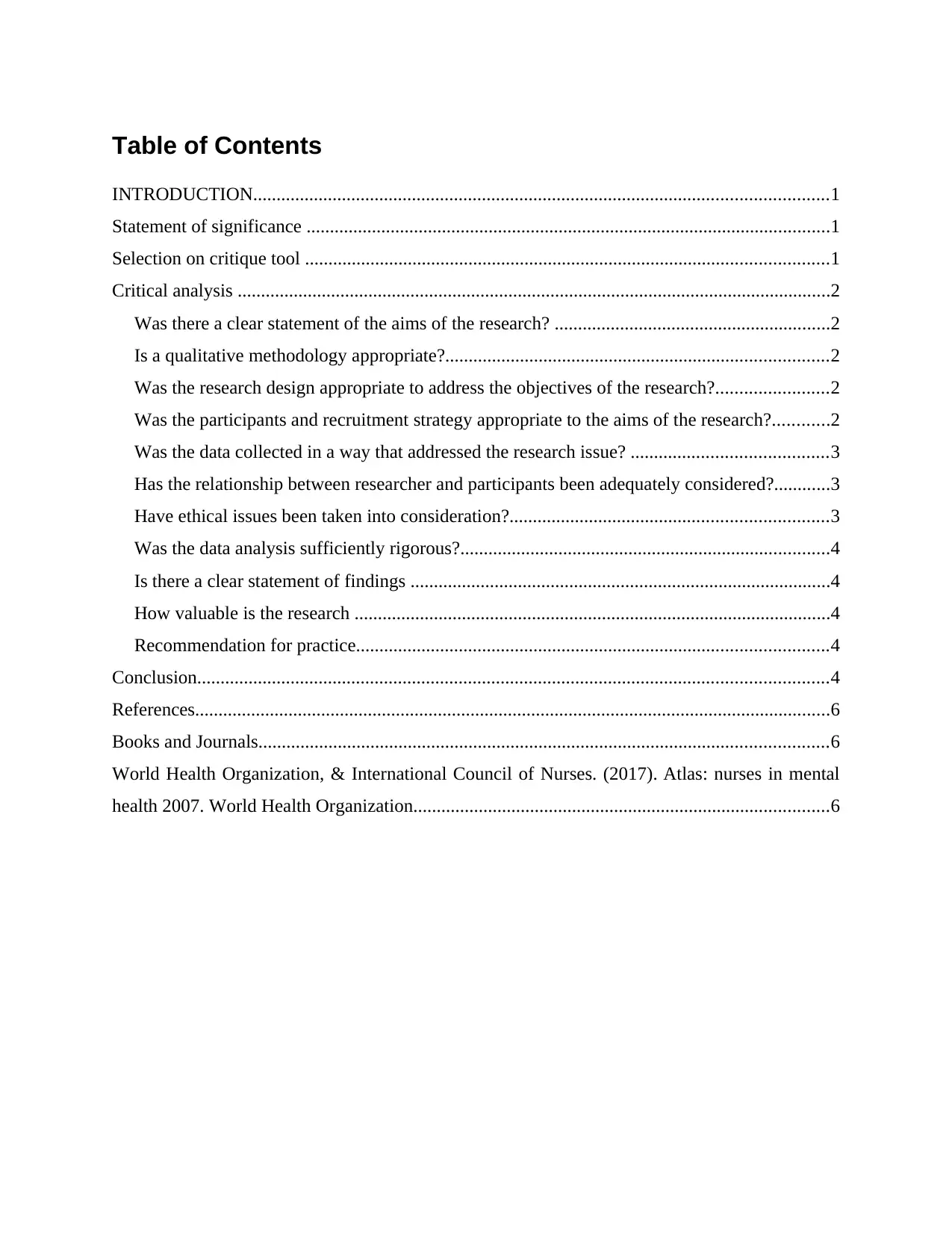
Table of Contents
INTRODUCTION...........................................................................................................................1
Statement of significance ................................................................................................................1
Selection on critique tool ................................................................................................................1
Critical analysis ...............................................................................................................................2
Was there a clear statement of the aims of the research? ...........................................................2
Is a qualitative methodology appropriate?..................................................................................2
Was the research design appropriate to address the objectives of the research?........................2
Was the participants and recruitment strategy appropriate to the aims of the research?............2
Was the data collected in a way that addressed the research issue? ..........................................3
Has the relationship between researcher and participants been adequately considered?............3
Have ethical issues been taken into consideration?....................................................................3
Was the data analysis sufficiently rigorous?...............................................................................4
Is there a clear statement of findings ..........................................................................................4
How valuable is the research ......................................................................................................4
Recommendation for practice.....................................................................................................4
Conclusion.......................................................................................................................................4
References........................................................................................................................................6
Books and Journals..........................................................................................................................6
World Health Organization, & International Council of Nurses. (2017). Atlas: nurses in mental
health 2007. World Health Organization.........................................................................................6
INTRODUCTION...........................................................................................................................1
Statement of significance ................................................................................................................1
Selection on critique tool ................................................................................................................1
Critical analysis ...............................................................................................................................2
Was there a clear statement of the aims of the research? ...........................................................2
Is a qualitative methodology appropriate?..................................................................................2
Was the research design appropriate to address the objectives of the research?........................2
Was the participants and recruitment strategy appropriate to the aims of the research?............2
Was the data collected in a way that addressed the research issue? ..........................................3
Has the relationship between researcher and participants been adequately considered?............3
Have ethical issues been taken into consideration?....................................................................3
Was the data analysis sufficiently rigorous?...............................................................................4
Is there a clear statement of findings ..........................................................................................4
How valuable is the research ......................................................................................................4
Recommendation for practice.....................................................................................................4
Conclusion.......................................................................................................................................4
References........................................................................................................................................6
Books and Journals..........................................................................................................................6
World Health Organization, & International Council of Nurses. (2017). Atlas: nurses in mental
health 2007. World Health Organization.........................................................................................6
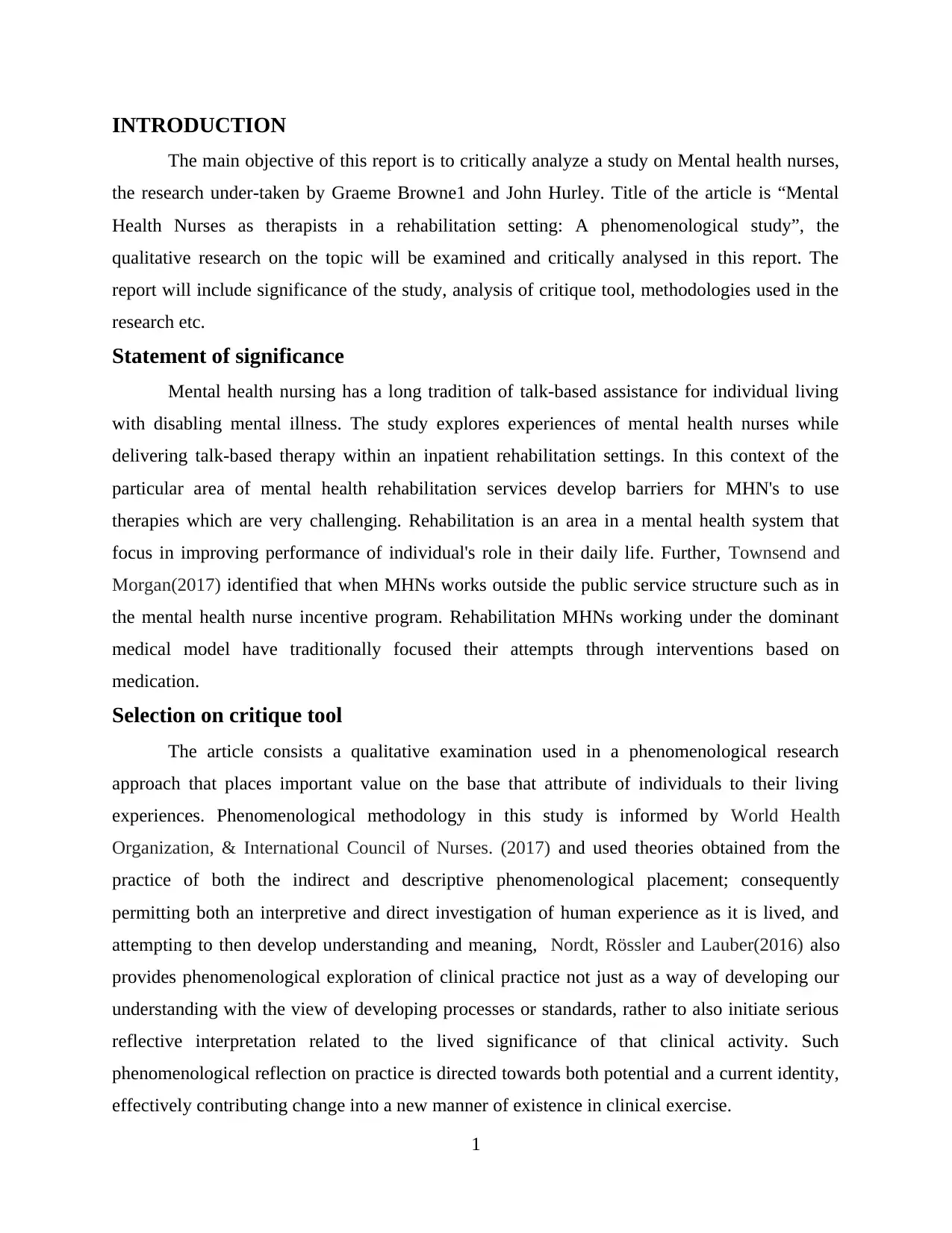
INTRODUCTION
The main objective of this report is to critically analyze a study on Mental health nurses,
the research under-taken by Graeme Browne1 and John Hurley. Title of the article is “Mental
Health Nurses as therapists in a rehabilitation setting: A phenomenological study”, the
qualitative research on the topic will be examined and critically analysed in this report. The
report will include significance of the study, analysis of critique tool, methodologies used in the
research etc.
Statement of significance
Mental health nursing has a long tradition of talk-based assistance for individual living
with disabling mental illness. The study explores experiences of mental health nurses while
delivering talk-based therapy within an inpatient rehabilitation settings. In this context of the
particular area of mental health rehabilitation services develop barriers for MHN's to use
therapies which are very challenging. Rehabilitation is an area in a mental health system that
focus in improving performance of individual's role in their daily life. Further, Townsend and
Morgan(2017) identified that when MHNs works outside the public service structure such as in
the mental health nurse incentive program. Rehabilitation MHNs working under the dominant
medical model have traditionally focused their attempts through interventions based on
medication.
Selection on critique tool
The article consists a qualitative examination used in a phenomenological research
approach that places important value on the base that attribute of individuals to their living
experiences. Phenomenological methodology in this study is informed by World Health
Organization, & International Council of Nurses. (2017) and used theories obtained from the
practice of both the indirect and descriptive phenomenological placement; consequently
permitting both an interpretive and direct investigation of human experience as it is lived, and
attempting to then develop understanding and meaning, Nordt, Rössler and Lauber(2016) also
provides phenomenological exploration of clinical practice not just as a way of developing our
understanding with the view of developing processes or standards, rather to also initiate serious
reflective interpretation related to the lived significance of that clinical activity. Such
phenomenological reflection on practice is directed towards both potential and a current identity,
effectively contributing change into a new manner of existence in clinical exercise.
1
The main objective of this report is to critically analyze a study on Mental health nurses,
the research under-taken by Graeme Browne1 and John Hurley. Title of the article is “Mental
Health Nurses as therapists in a rehabilitation setting: A phenomenological study”, the
qualitative research on the topic will be examined and critically analysed in this report. The
report will include significance of the study, analysis of critique tool, methodologies used in the
research etc.
Statement of significance
Mental health nursing has a long tradition of talk-based assistance for individual living
with disabling mental illness. The study explores experiences of mental health nurses while
delivering talk-based therapy within an inpatient rehabilitation settings. In this context of the
particular area of mental health rehabilitation services develop barriers for MHN's to use
therapies which are very challenging. Rehabilitation is an area in a mental health system that
focus in improving performance of individual's role in their daily life. Further, Townsend and
Morgan(2017) identified that when MHNs works outside the public service structure such as in
the mental health nurse incentive program. Rehabilitation MHNs working under the dominant
medical model have traditionally focused their attempts through interventions based on
medication.
Selection on critique tool
The article consists a qualitative examination used in a phenomenological research
approach that places important value on the base that attribute of individuals to their living
experiences. Phenomenological methodology in this study is informed by World Health
Organization, & International Council of Nurses. (2017) and used theories obtained from the
practice of both the indirect and descriptive phenomenological placement; consequently
permitting both an interpretive and direct investigation of human experience as it is lived, and
attempting to then develop understanding and meaning, Nordt, Rössler and Lauber(2016) also
provides phenomenological exploration of clinical practice not just as a way of developing our
understanding with the view of developing processes or standards, rather to also initiate serious
reflective interpretation related to the lived significance of that clinical activity. Such
phenomenological reflection on practice is directed towards both potential and a current identity,
effectively contributing change into a new manner of existence in clinical exercise.
1
⊘ This is a preview!⊘
Do you want full access?
Subscribe today to unlock all pages.

Trusted by 1+ million students worldwide
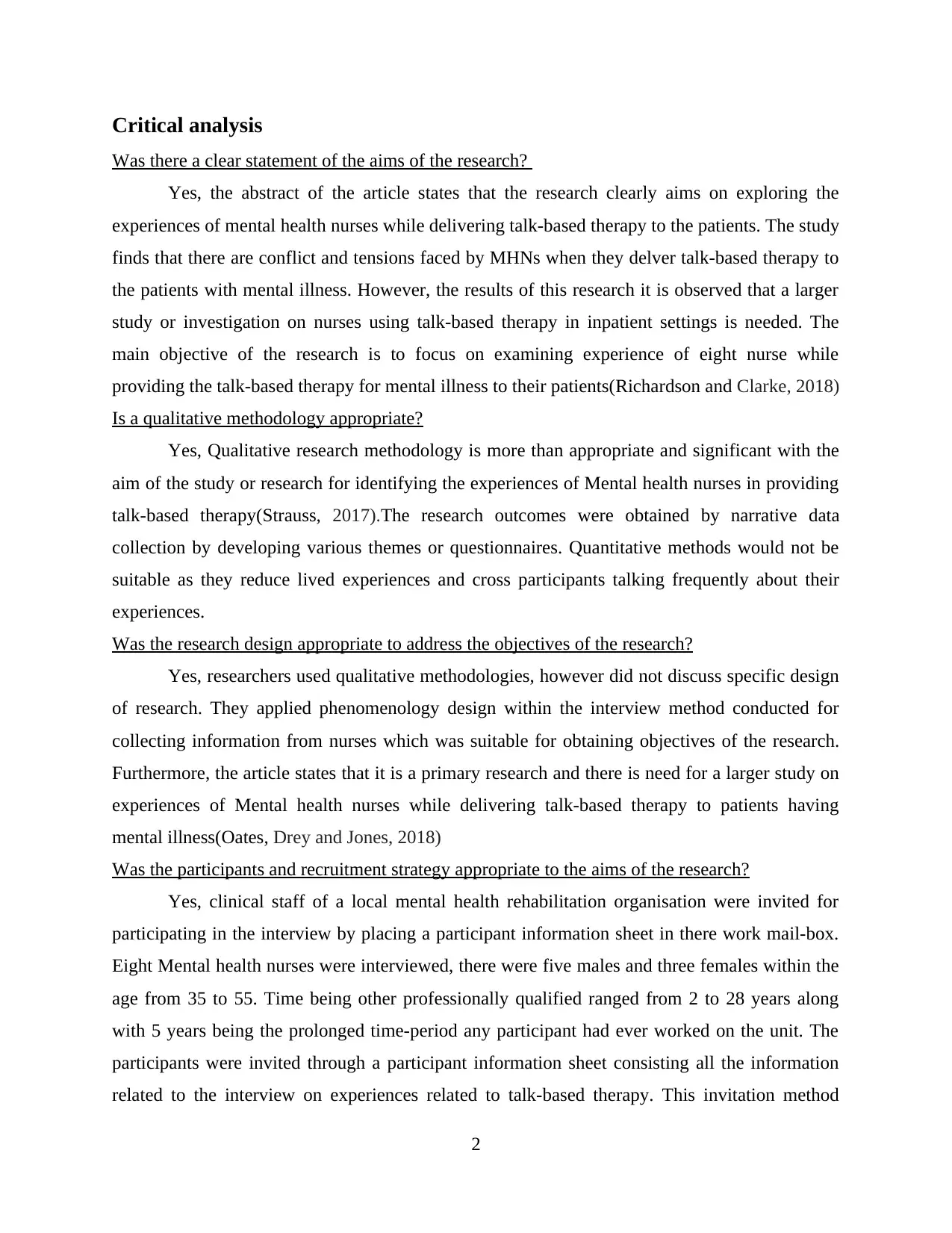
Critical analysis
Was there a clear statement of the aims of the research?
Yes, the abstract of the article states that the research clearly aims on exploring the
experiences of mental health nurses while delivering talk-based therapy to the patients. The study
finds that there are conflict and tensions faced by MHNs when they delver talk-based therapy to
the patients with mental illness. However, the results of this research it is observed that a larger
study or investigation on nurses using talk-based therapy in inpatient settings is needed. The
main objective of the research is to focus on examining experience of eight nurse while
providing the talk-based therapy for mental illness to their patients(Richardson and Clarke, 2018)
Is a qualitative methodology appropriate?
Yes, Qualitative research methodology is more than appropriate and significant with the
aim of the study or research for identifying the experiences of Mental health nurses in providing
talk-based therapy(Strauss, 2017).The research outcomes were obtained by narrative data
collection by developing various themes or questionnaires. Quantitative methods would not be
suitable as they reduce lived experiences and cross participants talking frequently about their
experiences.
Was the research design appropriate to address the objectives of the research?
Yes, researchers used qualitative methodologies, however did not discuss specific design
of research. They applied phenomenology design within the interview method conducted for
collecting information from nurses which was suitable for obtaining objectives of the research.
Furthermore, the article states that it is a primary research and there is need for a larger study on
experiences of Mental health nurses while delivering talk-based therapy to patients having
mental illness(Oates, Drey and Jones, 2018)
Was the participants and recruitment strategy appropriate to the aims of the research?
Yes, clinical staff of a local mental health rehabilitation organisation were invited for
participating in the interview by placing a participant information sheet in there work mail-box.
Eight Mental health nurses were interviewed, there were five males and three females within the
age from 35 to 55. Time being other professionally qualified ranged from 2 to 28 years along
with 5 years being the prolonged time-period any participant had ever worked on the unit. The
participants were invited through a participant information sheet consisting all the information
related to the interview on experiences related to talk-based therapy. This invitation method
2
Was there a clear statement of the aims of the research?
Yes, the abstract of the article states that the research clearly aims on exploring the
experiences of mental health nurses while delivering talk-based therapy to the patients. The study
finds that there are conflict and tensions faced by MHNs when they delver talk-based therapy to
the patients with mental illness. However, the results of this research it is observed that a larger
study or investigation on nurses using talk-based therapy in inpatient settings is needed. The
main objective of the research is to focus on examining experience of eight nurse while
providing the talk-based therapy for mental illness to their patients(Richardson and Clarke, 2018)
Is a qualitative methodology appropriate?
Yes, Qualitative research methodology is more than appropriate and significant with the
aim of the study or research for identifying the experiences of Mental health nurses in providing
talk-based therapy(Strauss, 2017).The research outcomes were obtained by narrative data
collection by developing various themes or questionnaires. Quantitative methods would not be
suitable as they reduce lived experiences and cross participants talking frequently about their
experiences.
Was the research design appropriate to address the objectives of the research?
Yes, researchers used qualitative methodologies, however did not discuss specific design
of research. They applied phenomenology design within the interview method conducted for
collecting information from nurses which was suitable for obtaining objectives of the research.
Furthermore, the article states that it is a primary research and there is need for a larger study on
experiences of Mental health nurses while delivering talk-based therapy to patients having
mental illness(Oates, Drey and Jones, 2018)
Was the participants and recruitment strategy appropriate to the aims of the research?
Yes, clinical staff of a local mental health rehabilitation organisation were invited for
participating in the interview by placing a participant information sheet in there work mail-box.
Eight Mental health nurses were interviewed, there were five males and three females within the
age from 35 to 55. Time being other professionally qualified ranged from 2 to 28 years along
with 5 years being the prolonged time-period any participant had ever worked on the unit. The
participants were invited through a participant information sheet consisting all the information
related to the interview on experiences related to talk-based therapy. This invitation method
2
Paraphrase This Document
Need a fresh take? Get an instant paraphrase of this document with our AI Paraphraser
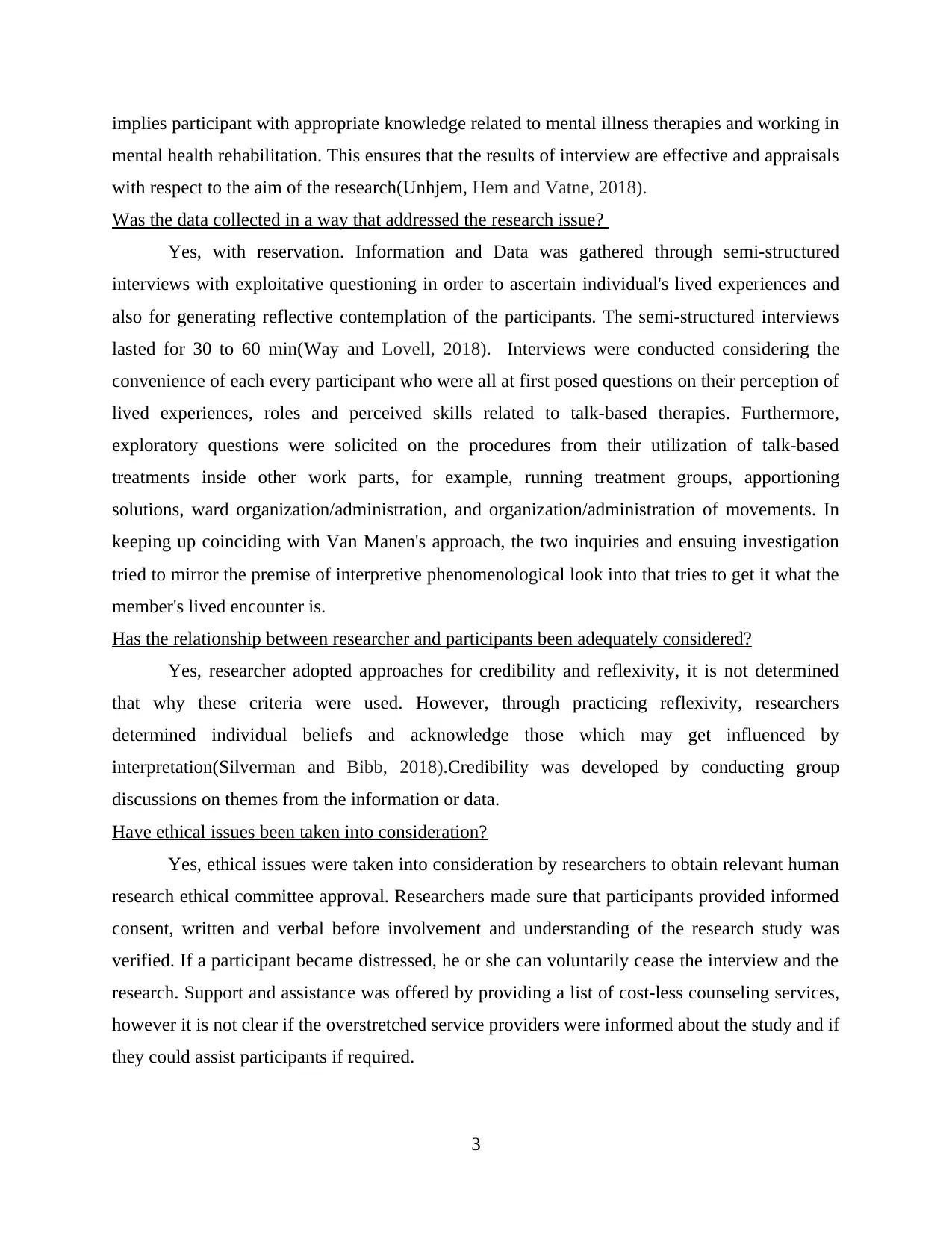
implies participant with appropriate knowledge related to mental illness therapies and working in
mental health rehabilitation. This ensures that the results of interview are effective and appraisals
with respect to the aim of the research(Unhjem, Hem and Vatne, 2018).
Was the data collected in a way that addressed the research issue?
Yes, with reservation. Information and Data was gathered through semi-structured
interviews with exploitative questioning in order to ascertain individual's lived experiences and
also for generating reflective contemplation of the participants. The semi-structured interviews
lasted for 30 to 60 min(Way and Lovell, 2018). Interviews were conducted considering the
convenience of each every participant who were all at first posed questions on their perception of
lived experiences, roles and perceived skills related to talk-based therapies. Furthermore,
exploratory questions were solicited on the procedures from their utilization of talk-based
treatments inside other work parts, for example, running treatment groups, apportioning
solutions, ward organization/administration, and organization/administration of movements. In
keeping up coinciding with Van Manen's approach, the two inquiries and ensuing investigation
tried to mirror the premise of interpretive phenomenological look into that tries to get it what the
member's lived encounter is.
Has the relationship between researcher and participants been adequately considered?
Yes, researcher adopted approaches for credibility and reflexivity, it is not determined
that why these criteria were used. However, through practicing reflexivity, researchers
determined individual beliefs and acknowledge those which may get influenced by
interpretation(Silverman and Bibb, 2018).Credibility was developed by conducting group
discussions on themes from the information or data.
Have ethical issues been taken into consideration?
Yes, ethical issues were taken into consideration by researchers to obtain relevant human
research ethical committee approval. Researchers made sure that participants provided informed
consent, written and verbal before involvement and understanding of the research study was
verified. If a participant became distressed, he or she can voluntarily cease the interview and the
research. Support and assistance was offered by providing a list of cost-less counseling services,
however it is not clear if the overstretched service providers were informed about the study and if
they could assist participants if required.
3
mental health rehabilitation. This ensures that the results of interview are effective and appraisals
with respect to the aim of the research(Unhjem, Hem and Vatne, 2018).
Was the data collected in a way that addressed the research issue?
Yes, with reservation. Information and Data was gathered through semi-structured
interviews with exploitative questioning in order to ascertain individual's lived experiences and
also for generating reflective contemplation of the participants. The semi-structured interviews
lasted for 30 to 60 min(Way and Lovell, 2018). Interviews were conducted considering the
convenience of each every participant who were all at first posed questions on their perception of
lived experiences, roles and perceived skills related to talk-based therapies. Furthermore,
exploratory questions were solicited on the procedures from their utilization of talk-based
treatments inside other work parts, for example, running treatment groups, apportioning
solutions, ward organization/administration, and organization/administration of movements. In
keeping up coinciding with Van Manen's approach, the two inquiries and ensuing investigation
tried to mirror the premise of interpretive phenomenological look into that tries to get it what the
member's lived encounter is.
Has the relationship between researcher and participants been adequately considered?
Yes, researcher adopted approaches for credibility and reflexivity, it is not determined
that why these criteria were used. However, through practicing reflexivity, researchers
determined individual beliefs and acknowledge those which may get influenced by
interpretation(Silverman and Bibb, 2018).Credibility was developed by conducting group
discussions on themes from the information or data.
Have ethical issues been taken into consideration?
Yes, ethical issues were taken into consideration by researchers to obtain relevant human
research ethical committee approval. Researchers made sure that participants provided informed
consent, written and verbal before involvement and understanding of the research study was
verified. If a participant became distressed, he or she can voluntarily cease the interview and the
research. Support and assistance was offered by providing a list of cost-less counseling services,
however it is not clear if the overstretched service providers were informed about the study and if
they could assist participants if required.
3
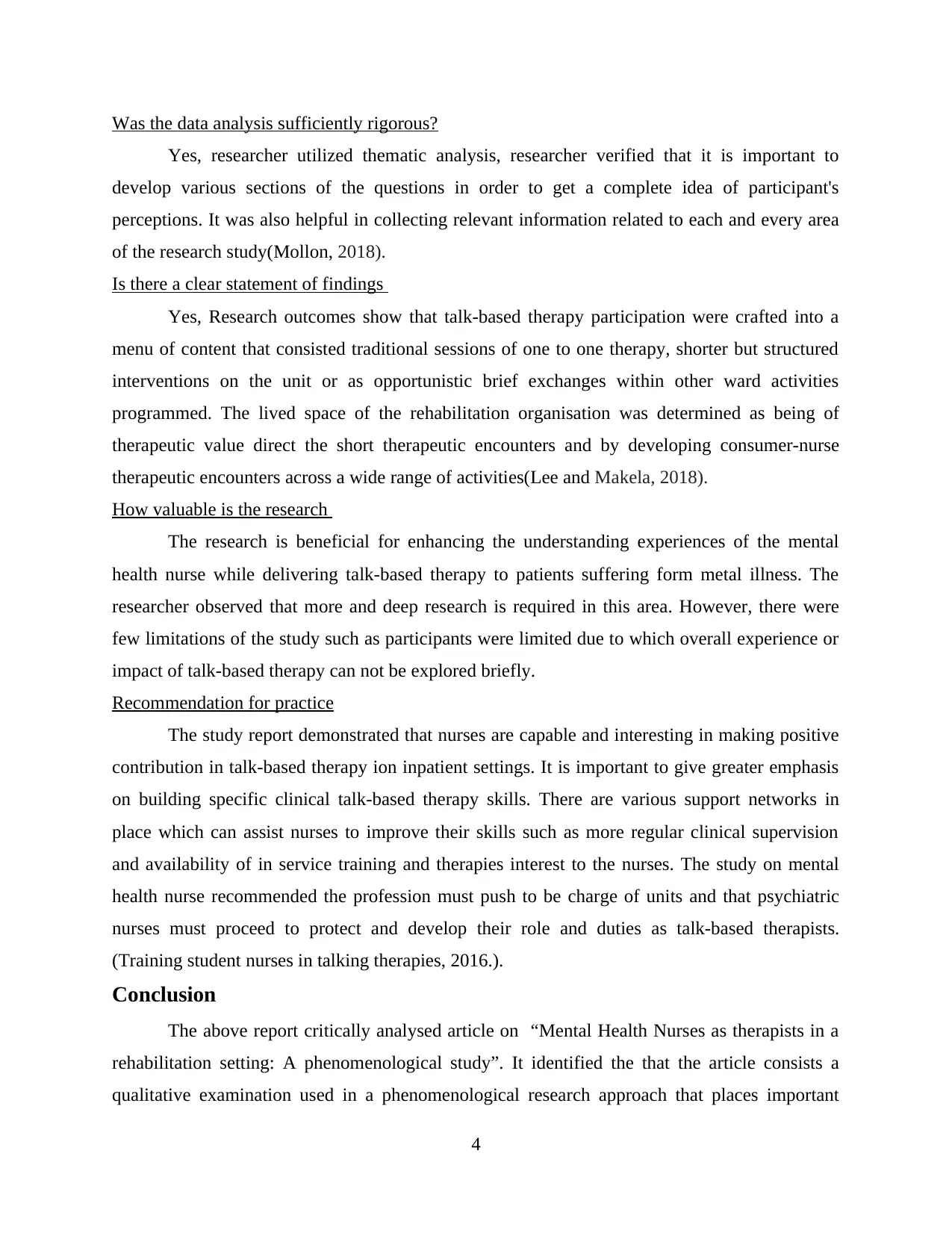
Was the data analysis sufficiently rigorous?
Yes, researcher utilized thematic analysis, researcher verified that it is important to
develop various sections of the questions in order to get a complete idea of participant's
perceptions. It was also helpful in collecting relevant information related to each and every area
of the research study(Mollon, 2018).
Is there a clear statement of findings
Yes, Research outcomes show that talk-based therapy participation were crafted into a
menu of content that consisted traditional sessions of one to one therapy, shorter but structured
interventions on the unit or as opportunistic brief exchanges within other ward activities
programmed. The lived space of the rehabilitation organisation was determined as being of
therapeutic value direct the short therapeutic encounters and by developing consumer-nurse
therapeutic encounters across a wide range of activities(Lee and Makela, 2018).
How valuable is the research
The research is beneficial for enhancing the understanding experiences of the mental
health nurse while delivering talk-based therapy to patients suffering form metal illness. The
researcher observed that more and deep research is required in this area. However, there were
few limitations of the study such as participants were limited due to which overall experience or
impact of talk-based therapy can not be explored briefly.
Recommendation for practice
The study report demonstrated that nurses are capable and interesting in making positive
contribution in talk-based therapy ion inpatient settings. It is important to give greater emphasis
on building specific clinical talk-based therapy skills. There are various support networks in
place which can assist nurses to improve their skills such as more regular clinical supervision
and availability of in service training and therapies interest to the nurses. The study on mental
health nurse recommended the profession must push to be charge of units and that psychiatric
nurses must proceed to protect and develop their role and duties as talk-based therapists.
(Training student nurses in talking therapies, 2016.).
Conclusion
The above report critically analysed article on “Mental Health Nurses as therapists in a
rehabilitation setting: A phenomenological study”. It identified the that the article consists a
qualitative examination used in a phenomenological research approach that places important
4
Yes, researcher utilized thematic analysis, researcher verified that it is important to
develop various sections of the questions in order to get a complete idea of participant's
perceptions. It was also helpful in collecting relevant information related to each and every area
of the research study(Mollon, 2018).
Is there a clear statement of findings
Yes, Research outcomes show that talk-based therapy participation were crafted into a
menu of content that consisted traditional sessions of one to one therapy, shorter but structured
interventions on the unit or as opportunistic brief exchanges within other ward activities
programmed. The lived space of the rehabilitation organisation was determined as being of
therapeutic value direct the short therapeutic encounters and by developing consumer-nurse
therapeutic encounters across a wide range of activities(Lee and Makela, 2018).
How valuable is the research
The research is beneficial for enhancing the understanding experiences of the mental
health nurse while delivering talk-based therapy to patients suffering form metal illness. The
researcher observed that more and deep research is required in this area. However, there were
few limitations of the study such as participants were limited due to which overall experience or
impact of talk-based therapy can not be explored briefly.
Recommendation for practice
The study report demonstrated that nurses are capable and interesting in making positive
contribution in talk-based therapy ion inpatient settings. It is important to give greater emphasis
on building specific clinical talk-based therapy skills. There are various support networks in
place which can assist nurses to improve their skills such as more regular clinical supervision
and availability of in service training and therapies interest to the nurses. The study on mental
health nurse recommended the profession must push to be charge of units and that psychiatric
nurses must proceed to protect and develop their role and duties as talk-based therapists.
(Training student nurses in talking therapies, 2016.).
Conclusion
The above report critically analysed article on “Mental Health Nurses as therapists in a
rehabilitation setting: A phenomenological study”. It identified the that the article consists a
qualitative examination used in a phenomenological research approach that places important
4
⊘ This is a preview!⊘
Do you want full access?
Subscribe today to unlock all pages.

Trusted by 1+ million students worldwide

value on the base that attribute of individuals to their living experiences. The report also
identified the ethical consideration and recommendation related to talk-based therapy used my
mental health nurses.
5
identified the ethical consideration and recommendation related to talk-based therapy used my
mental health nurses.
5
Paraphrase This Document
Need a fresh take? Get an instant paraphrase of this document with our AI Paraphraser
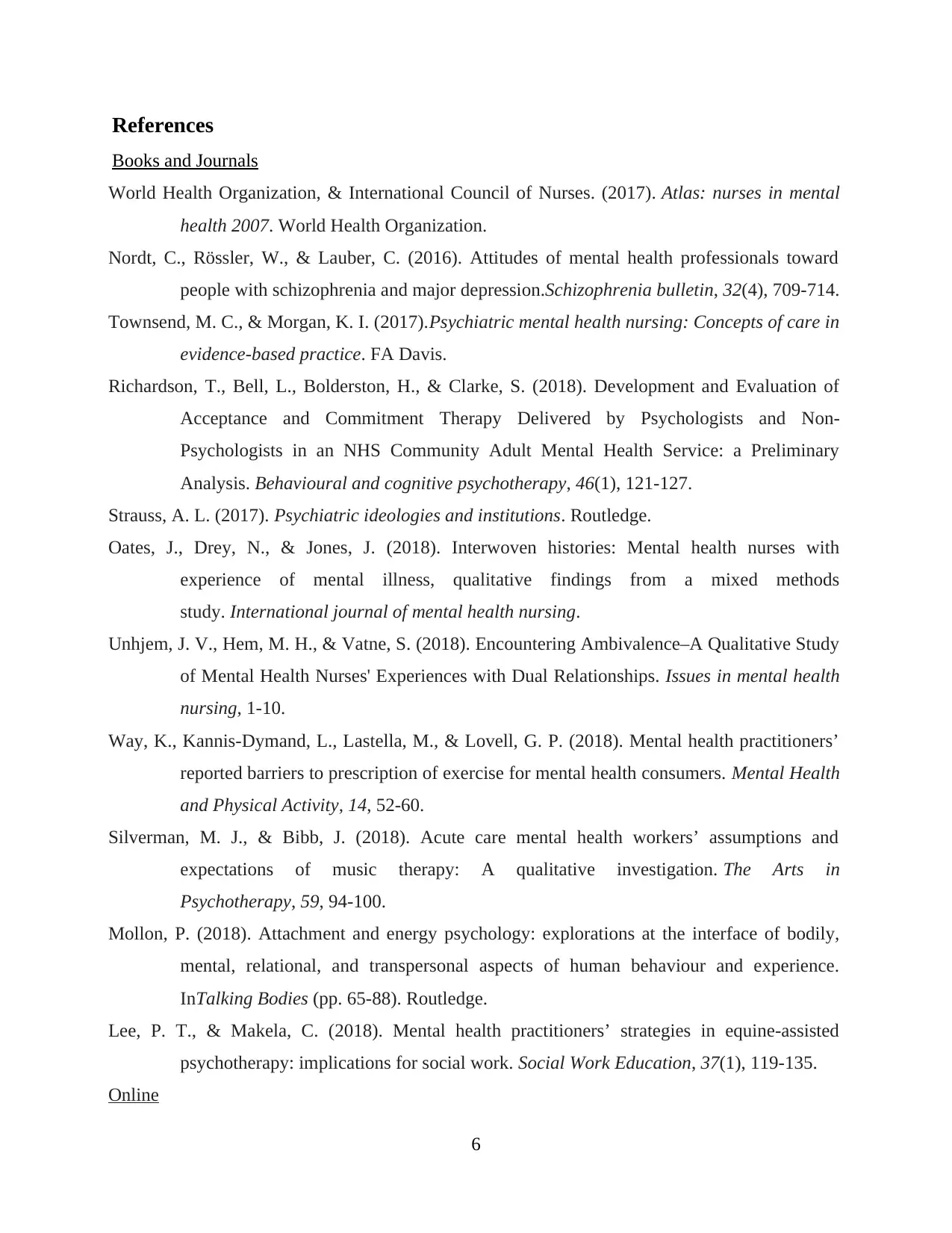
References
Books and Journals
World Health Organization, & International Council of Nurses. (2017). Atlas: nurses in mental
health 2007. World Health Organization.
Nordt, C., Rössler, W., & Lauber, C. (2016). Attitudes of mental health professionals toward
people with schizophrenia and major depression.Schizophrenia bulletin, 32(4), 709-714.
Townsend, M. C., & Morgan, K. I. (2017).Psychiatric mental health nursing: Concepts of care in
evidence-based practice. FA Davis.
Richardson, T., Bell, L., Bolderston, H., & Clarke, S. (2018). Development and Evaluation of
Acceptance and Commitment Therapy Delivered by Psychologists and Non-
Psychologists in an NHS Community Adult Mental Health Service: a Preliminary
Analysis. Behavioural and cognitive psychotherapy, 46(1), 121-127.
Strauss, A. L. (2017). Psychiatric ideologies and institutions. Routledge.
Oates, J., Drey, N., & Jones, J. (2018). Interwoven histories: Mental health nurses with
experience of mental illness, qualitative findings from a mixed methods
study. International journal of mental health nursing.
Unhjem, J. V., Hem, M. H., & Vatne, S. (2018). Encountering Ambivalence–A Qualitative Study
of Mental Health Nurses' Experiences with Dual Relationships. Issues in mental health
nursing, 1-10.
Way, K., Kannis-Dymand, L., Lastella, M., & Lovell, G. P. (2018). Mental health practitioners’
reported barriers to prescription of exercise for mental health consumers. Mental Health
and Physical Activity, 14, 52-60.
Silverman, M. J., & Bibb, J. (2018). Acute care mental health workers’ assumptions and
expectations of music therapy: A qualitative investigation. The Arts in
Psychotherapy, 59, 94-100.
Mollon, P. (2018). Attachment and energy psychology: explorations at the interface of bodily,
mental, relational, and transpersonal aspects of human behaviour and experience.
InTalking Bodies (pp. 65-88). Routledge.
Lee, P. T., & Makela, C. (2018). Mental health practitioners’ strategies in equine-assisted
psychotherapy: implications for social work. Social Work Education, 37(1), 119-135.
Online
6
Books and Journals
World Health Organization, & International Council of Nurses. (2017). Atlas: nurses in mental
health 2007. World Health Organization.
Nordt, C., Rössler, W., & Lauber, C. (2016). Attitudes of mental health professionals toward
people with schizophrenia and major depression.Schizophrenia bulletin, 32(4), 709-714.
Townsend, M. C., & Morgan, K. I. (2017).Psychiatric mental health nursing: Concepts of care in
evidence-based practice. FA Davis.
Richardson, T., Bell, L., Bolderston, H., & Clarke, S. (2018). Development and Evaluation of
Acceptance and Commitment Therapy Delivered by Psychologists and Non-
Psychologists in an NHS Community Adult Mental Health Service: a Preliminary
Analysis. Behavioural and cognitive psychotherapy, 46(1), 121-127.
Strauss, A. L. (2017). Psychiatric ideologies and institutions. Routledge.
Oates, J., Drey, N., & Jones, J. (2018). Interwoven histories: Mental health nurses with
experience of mental illness, qualitative findings from a mixed methods
study. International journal of mental health nursing.
Unhjem, J. V., Hem, M. H., & Vatne, S. (2018). Encountering Ambivalence–A Qualitative Study
of Mental Health Nurses' Experiences with Dual Relationships. Issues in mental health
nursing, 1-10.
Way, K., Kannis-Dymand, L., Lastella, M., & Lovell, G. P. (2018). Mental health practitioners’
reported barriers to prescription of exercise for mental health consumers. Mental Health
and Physical Activity, 14, 52-60.
Silverman, M. J., & Bibb, J. (2018). Acute care mental health workers’ assumptions and
expectations of music therapy: A qualitative investigation. The Arts in
Psychotherapy, 59, 94-100.
Mollon, P. (2018). Attachment and energy psychology: explorations at the interface of bodily,
mental, relational, and transpersonal aspects of human behaviour and experience.
InTalking Bodies (pp. 65-88). Routledge.
Lee, P. T., & Makela, C. (2018). Mental health practitioners’ strategies in equine-assisted
psychotherapy: implications for social work. Social Work Education, 37(1), 119-135.
Online
6

Training student nurses in talking therapies, 2016. [Online]. Available
through:<<https://www.nursingtimes.net/students/training-student-nurses-in
talkingtherapies/7009472.articl>
7
through:<<https://www.nursingtimes.net/students/training-student-nurses-in
talkingtherapies/7009472.articl>
7
⊘ This is a preview!⊘
Do you want full access?
Subscribe today to unlock all pages.

Trusted by 1+ million students worldwide
1 out of 9
Related Documents
Your All-in-One AI-Powered Toolkit for Academic Success.
+13062052269
info@desklib.com
Available 24*7 on WhatsApp / Email
![[object Object]](/_next/static/media/star-bottom.7253800d.svg)
Unlock your academic potential
Copyright © 2020–2026 A2Z Services. All Rights Reserved. Developed and managed by ZUCOL.





